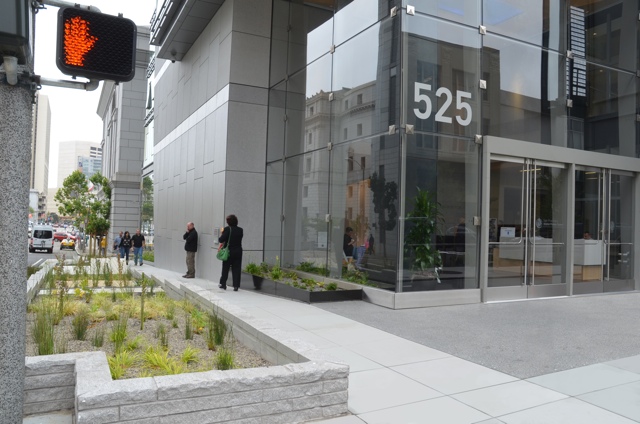Last week, the city of San Francisco announced the grand opening of the Greenest Urban Office Building in North America. The new San Francisco Public Utilities Commission Building (SFPUC) boasts new Living Machine technology, as well as LEED Platinum standards.
The 13-floor building can hold around 900 people, but consumes 60% less water and 32% less energy than most buildings of its kind. The building can achieve these high levels of conservation due it its on-site grey and black water treatment.
The technology for this treatment, The Living Machine, reclaims and treats all of the building’s wastewater– meeting the demand for all of the buildings toilets. The Living Machine can treat 5,000 gallons of water daily, reducing per-person water use from 12 to five gallons. The building also has a rainwater harvesting system that can store up to 250,000 gallons of water annually for use in the building’s irrigation systems.
As far as power goes, the building uses a greenhouse gas-free power from the Hetch Hetchy Reservoir, but also has an integrated hybrid solar array as well as a wind turbine that can generation about seven percent of the building’s annual energy needs.
The building was designed with a raised flooring system to house its data and ventilation infrastructure that also reduces heating, cooling and ventilation costs by over half. They also plan to do the more simple things, like automatically shut off workstation power after business hours, use more sustainable building materials, and limit parking to encourage alternative transportation among employees.
“The unique hybrid wind-solar installation combined with the use of onsite, recycled wastewater makes 525 Golden Gate one of the most self-sustaining buildings anywhere in the world,” said SFPUC General Manager Ed Harrington as part of the announcement. “We did not spare any detail to demonstrate the water-saving and energy efficiency revolution that all of us must start to embrace.”
However, the building cost the city a whopping $146.5 million– which brings back the argument between building new energy efficient buildings, or spending the money to make the ones we already have perform better. There isn’t a right answer, what’s probably best is for there to be a combination of the two– a new building should be built to high energy standards, but some time and resources should be taken to reboot the clunky power-wasters that remain in every city.
Employees are set to move in to their new space in July and August, and the building is set to be on track for its Platinum LEED ranking within a year of operation. The SFPUC estimates that building and owning its new headquarters will allow the department to save residents around $3.7 billion over the expected 100 year life of the building. +
--
Beth Carter is a contributing editor for SmartPlanet.
Related Stories
Urban Planning | Apr 12, 2023
Watch: Trends in urban design for 2023, with James Corner Field Operations
Isabel Castilla, a Principal Designer with the landscape architecture firm James Corner Field Operations, discusses recent changes in clients' priorities about urban design, with a focus on her firm's recent projects.
3D Printing | Apr 11, 2023
University of Michigan’s DART Laboratory unveils Shell Wall—a concrete wall that’s lightweight and freeform 3D printed
The University of Michigan’s DART Laboratory has unveiled a new product called Shell Wall—which the organization describes as the first lightweight, freeform 3D printed and structurally reinforced concrete wall. The innovative product leverages DART Laboratory’s research and development on the use of 3D-printing technology to build structures that require less concrete.
Market Data | Apr 11, 2023
Construction crane count reaches all-time high in Q1 2023
Toronto, Seattle, Los Angeles, and Denver top the list of U.S/Canadian cities with the greatest number of fixed cranes on construction sites, according to Rider Levett Bucknall's RLB Crane Index for North America for Q1 2023.
University Buildings | Apr 11, 2023
Supersizing higher education: Tracking the rise of mega buildings on university campuses
Mega buildings on higher education campuses aren’t unusual. But what has been different lately is the sheer number of supersized projects that have been in the works over the last 12–15 months.
Architects | Apr 10, 2023
Bill Hellmuth, FAIA, Chairman and CEO of HOK, dies at 69
William (Bill) Hellmuth, FAIA, the Chairman and CEO of HOK, passed away on April 6, 2023, after a long illness. Hellmuth designed dozens of award-winning buildings across the globe, including the Abu Dhabi National Oil Company Headquarters and the U.S. Embassy in Nairobi.
Contractors | Apr 10, 2023
What makes prefabrication work? Factors every construction project should consider
There are many factors requiring careful consideration when determining whether a project is a good fit for prefabrication. JE Dunn’s Brian Burkett breaks down the most important considerations.
Mixed-Use | Apr 7, 2023
New Nashville mixed-use high-rise features curved, stepped massing and wellness focus
Construction recently started on 5 City Blvd, a new 15-story office and mixed-use building in Nashville, Tenn. Located on a uniquely shaped site, the 730,000-sf structure features curved, stepped massing and amenities with a focus on wellness.
Smart Buildings | Apr 7, 2023
Carnegie Mellon University's research on advanced building sensors provokes heated controversy
A research project to test next-generation building sensors at Carnegie Mellon University provoked intense debate over the privacy implications of widespread deployment of the devices in a new 90,000-sf building. The light-switch-size devices, capable of measuring 12 types of data including motion and sound, were mounted in more than 300 locations throughout the building.
Affordable Housing | Apr 7, 2023
Florida’s affordable housing law expected to fuel multifamily residential projects
Florida Gov. Ron DeSantis recently signed into law affordable housing legislation that includes $711 million for housing programs and tax breaks for developers. The new law will supersede local governments’ zoning, density, and height requirements.
Energy Efficiency | Apr 7, 2023
Department of Energy makes $1 billion available for states, local governments to upgrade building codes
The U.S. Department of Energy is offering funding to help state and local governments upgrade their building codes to boost energy efficiency. The funding will support improved building codes that reduce carbon emissions and improve energy efficiency, according to DOE.
















